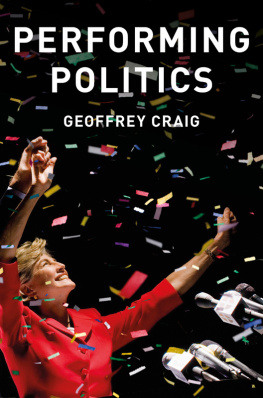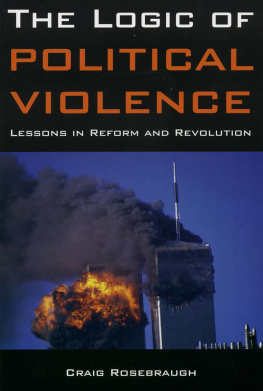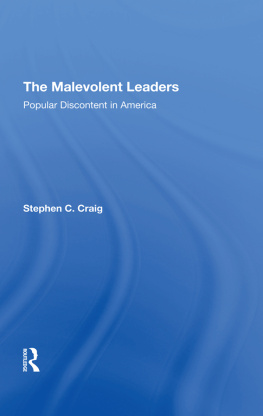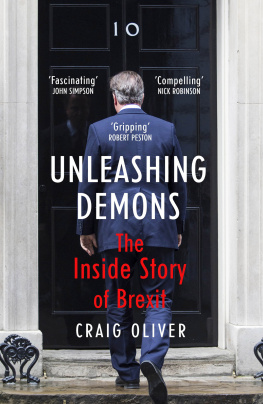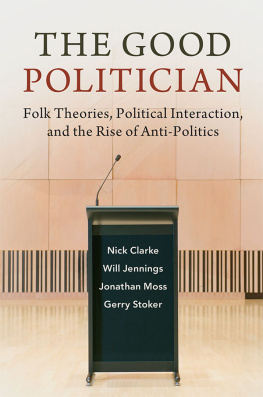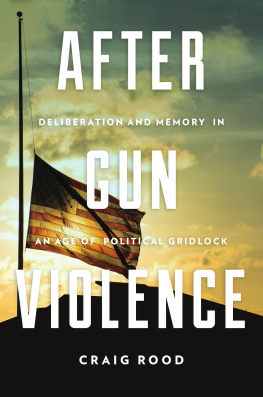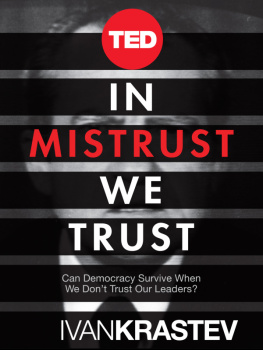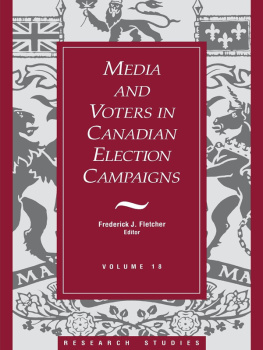
Copyright page
Copyright Geoffrey Craig 2016
The right of Geoffrey Craig to be identified as Author of this Work has been asserted in accordance with the UK Copyright, Designs and Patents Act 1988.
First published in 2016 by Polity Press
Polity Press
65 Bridge Street
Cambridge CB2 1UR, UK
Polity Press
350 Main Street
Malden, MA 02148, USA
All rights reserved. Except for the quotation of short passages for the purpose of criticism and review, no part of this publication may be reproduced, stored in a retrieval system, or transmitted, in any form or by any means, electronic, mechanical, photocopying, recording or otherwise, without the prior permission of the publisher.
ISBN-13: 978-0-7456-8961-6
ISBN-13: 978-0-7456-8962-3 (pb)
A catalogue record for this book is available from the British Library.
Library of Congress Cataloging-in-Publication Data
Names: Craig, Geoffrey.
Title: Performing politics : media interviews, debates and press conferences / Geoffrey Craig.
Description: Malden, MA : Polity Press, 2016. | Includes bibliographical references and index.
Identifiers: LCCN 2015038690| ISBN 9780745689616 (hardback : alk. paper) | ISBN 9780745689623 (papeback : alk. paper)
Subjects: LCSH: Communication in politics. | Mass mediaPolitical aspects.
Classification: LCC JA85 .C73 2016 | DDC 320.01/4dc23 LC record available at http://lccn.loc.gov/2015038690
Typeset in 10.5 on 12 pt Sabon
by Toppan Best-set Premedia Limited
Printed and bound in the UK by CPI Group (UK) Ltd, Croydon, CRO 4YY
The publisher has used its best endeavours to ensure that the URLs for external websites referred to in this book are correct and active at the time of going to press. However, the publisher has no responsibility for the websites and can make no guarantee that a site will remain live or that the content is or will remain appropriate.
Every effort has been made to trace all copyright holders, but if any have been inadvertently overlooked the publisher will be pleased to include any necessary credits in any subsequent reprint or edition.
For further information on Polity, visit our website: politybooks.com
Preface and Acknowledgements
The public performance of politics is significantly practised through interrogative exchanges in the media. Whether this consists of extended critical questioning in a political interview, prime ministerial posturing in a leaders' debate during the height of an election campaign, or the relaxed, jovial banter in an interview on a daytime chat show, political success is predicated on the ability to perform across a variety of such exchanges. These encounters are a vital means by which politicians promote themselves and are subject to scrutiny. Political leaders must express in a dramatic yet authentic way an individual identity or subjectivity, and their performances are realized by the successful negotiation of the power struggles that occur between the politicians themselves and the journalists they encounter.
This book will highlight broadcast interviews, leaders' debates and press conferences as fundamentally contestable encounters and argue that this dialogical (Bakhtin 1981, 1986) and agonistic (Mouffe 1993, 2000) quality is integral to political subject formation and democratic process. This argument is in contrast to research and public discourse that assesses how the conventions of interaction across types of mediated political interrogative exchanges fail to facilitate ideals of mutual understanding and truth production. In this sense, the book argues that public consternation over the games of contemporary political communication must be reoriented to appreciate how interviews, debates and press conferences represent necessary struggles over the meanings of important public issues. It does not offer a solution to the crisis of political communication: rather, it argues that we should understand that the games that are played in interviews, debates and press conferences are the necessary play of politics. This is not to be blind to the limitations of modern interactions between politicians and journalists or closed to seeking more constructive relations between the two, but it is to argue that we need to develop greater media and political literacy about such interrogative exchanges specifically, and political and media relations more generally.
It has been claimed that we live in an interview society (Atkinson and Silverman 1997) and that the interview is the fundamental act of contemporary journalism (Schudson 1994). Journalism researchers identify the importance of interviews, but such discussion is usually limited to the practice and mechanics of interviewing (Conley and Lamble 2006; Sedorkin 2011). Much existing scholarly research on political interviews, debates and press conferences has been dominated by linguistic studies that have focused at a textual level on the nature of exchanges between the participants (Clayman and Heritage 2002a; Tolson 2006). While these kinds of studies are vital in understanding the communicative effects of interviews, debates and press conferences, we are also concerned with locating such interactions in the contexts of a broader struggle between journalism and politics that can be illuminated with reference to media and political theory.
The first two chapters will outline the theoretical framework of the book. The opening chapter will provide a comprehensive theorization of the mediated and televisual contexts of interviews, debates and press conferences and the importance of individual performance and style in political and journalistic practice, in contrast to political communication research which sees media and public focus on image and performance as a distraction from more substantive political realities. It will begin by outlining the mediated basis of public life and then discuss both how disciplined bodily performance is integral to journalistic and political professionalism and why the reading of bodies is an important feature of the meanings of interviews, debates and press conferences. Bourdieu's concept of habitus will be introduced, and the chapter will conclude by offering a theorization of performance and, specifically, note the centrality of televisual performance to the production of political and journalistic identity.
The second chapter discusses the idea of the game that accounts for the discursive and institutional struggles between journalists and politicians in interrogative encounters. It introduces political interviews, leaders' debates and press conferences as communicative events, briefly accounting for their similar and different features and describing their significance as both face-to-face and highly mediated exchanges. The role of the public in such interactions is also considered. The chapter then explains how the political games that occur in political talk television formats derive from the contestable nature of both language and politics. The dialogical basis of language and the agonistic nature of politics will be outlined, and it will be argued that politics is concerned primarily with persuasion and trust and that the main task of journalists in interviews, debates and press conferences is not to discover the truth but to engage in a constant scrutiny that keeps the political open. Finally, the chapter will set out the methodological approaches that inform the analyses in the book.
Next page
